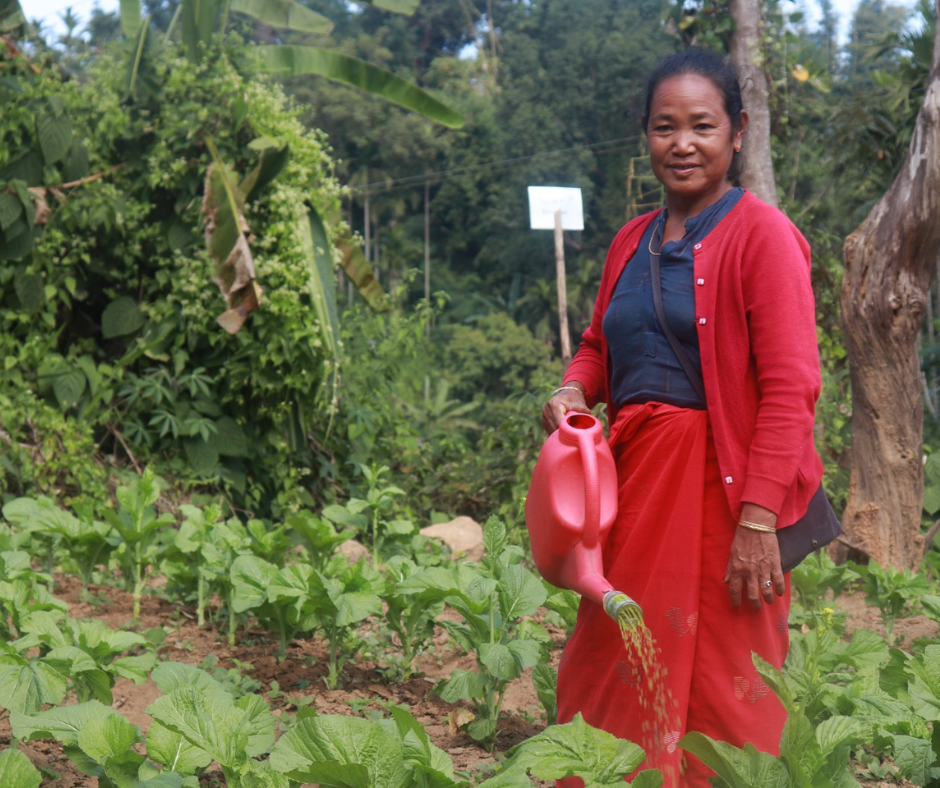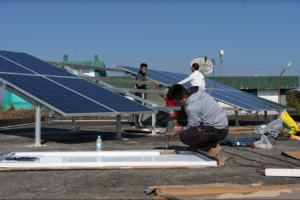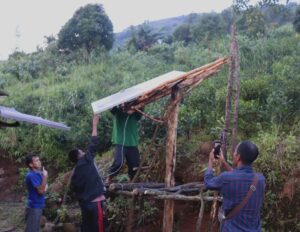The Indigenous food system is not unique but more importantly, it has also survived the test of time and continues to exist till today. Despite the popularity of conventional agriculture promoted by the Green Revolution, indigenous farming practice continue to persist among farmers in various regions of the state. Anyone with experience working with the farmers in the state can attest that the indigenous farming practices are very much alive and thriving in the state . Recognizing the strength of the existing farming practice, the North East Society for Agroecology Society (NESFAS) with the support of the Meghalaya Basin Development Agency (MBMA) and funded by World Bank, introduced the Agroecology Learning Circle (ALC). This initiative is also part of the innovation component within the Community-Led Landscape Management Project (CLLMP) led by the Agency.
What is Agroecology
Food and Agriculture Organisation (FAO) defines Agroecology as a holistic and integrated approach that simultaneously applies ecological and social concepts and principles to the design and management of sustainable agriculture and food systems. The system seeks to make the best use of the natural interaction between plants, animals, humans, and the environment. It also recognize that people can exercise choice of the kind of food they eat and where it is produced. Agroecology is now considered a science that has expanded from something that is only on the field and farm to that which encompasses the whole of agriculture and the food system. It is now a transdisciplinary system that includes an ecological, socio-cultural, technological, economic, and political dimension of the food system which starts from production to consumption.
It addresses the complex and interdependent challenges of livelihoods, health, and the management of natural resources through holistic approaches. It is looking at the fundamental connection between people and the planet, with sustainable agriculture and food systems. It is the focal point of the 2030 Agenda for Sustainable Development, which stresses the urgent need to take determined action and pursue policies that will lead to transformational change. It is attempting to achieve the SDG for example ending poverty and achieving zero hunger, while ensuring inclusive growth and sustainably managing the planet’s natural resources. It also looks in the context of climate change and biodiversity loss, and recognizing the fact that achieving these goals is possible through holistic and integrated approaches that respect human rights. Agroecology is also not conventional agriculture.
The 10 Principles of Agroecology
Agroecology operates on ten principles which include “Diversity” which recognize that ensuring food security and nutrition diversity as well as conserving, protecting, and enhancing natural resources is key to agroecological transitions. “Co-creation and sharing of knowledge” is another important principle of Agroecology and this means agricultural innovations respond better to local challenges when they are co-created by farmers through participatory processes. “Synergies” which means building synergies that enhance key functions across food systems, supporting production and multiple ecosystem services. is “Efficiency” which includes innovative agroecological practices that produce more using less external resources. The principle of “Recycling” promotes recycling of agricultural production which will lead to reduced economic and environmental costs. “Resilience” highlights the sustainable food systems can be enhanced by bolstering the resilience of people, communities, and. “Human and social values” prioritize the protection and enhancement of rural livelihoods, equity, and social well-being. “Cultural and food traditions” supports the maintenance of healthy, diverse, and culturally appropriate diets, that contributes to food and nutrition security and health of the ecosystems. Sustainable food and agriculture is enabled by the mechanisms of “Responsible governance at various levels from local to national to global. The principle of “Circular and solidarity economy” promotes an economy that reconnects producers and consumers and provides innovative solutions for living within our planetary boundaries while ensuring the social foundation for inclusive and sustainable development.
Why Agroecology Learning Circle?
The project by NESFAS, “Empowering Indigenous Communities through Agroecology Learning Circles (ALC) for Resilient, integrated and innovative natural resource management” is supported by MBMA and the World Bank. ALC is designed to foster community engagement and innovation, facilitating the sharing of knowledge, enhance collaborative efforts to co-create and test new solutions. Over the course of the 18-month-long project, 2039 farmers from 100 villages endeavored to document and disseminate acquired among the farmers. It aims at empowering indigenous communities by combining agroecology with participatory research. This, in turn, will help indigenous communities recognize, revive, practice, and further develop traditional farming practices and stimulate local innovation for a sustainable local food system.
It is a platform for farmers to discuss and plan their farming activities. It is also a space in which community members and experts meet to co-create and learn new skills and capacities. It is where new tools and processes were introduced to help enhance the agroecology practices of the locals and ensure food sovereignty and social transformation through local food initiatives.
ALC is one more institution in an already crowded Space
To enhance the income of farmers and stimulate the state’s economy, the government has promoted Self Help Groups (SHGs) and Producers Groups (PGs). In an effort to facilitate easy access to funds, the state government has introduced the Integrated Village Cooperative Society (IVCS). In parallel, the state has already established Village Natural Resource Management Committees (VNRMC) and Biodiversity Management Committees (BMC) to oversee and manage natural resources effectively. These measures collectively aim to empower local communities, enhance agricultural income, and foster sustainable resource management.
It may be mentioned that the Chief Minister while launching the new scheme called Elevate highlighted the creation of 40,000 SHGs in the last 5 years with a total funding of 500 crores. Additionally, an expenditure of 400 crore was allocated by the government to supoort 20,000 farmers’ likely referring to the Producers’ Group promoted under FOCUS. Given the substantial investment of the government in these existing projects, a question arises as to why there’s a need for another group when the village already have numerous such initiatives in place.
ALC Vehicle towards making Indigenous Peoples Food System (IPFS) the Game Changer in the food system
Indeed, while there are existing groups in villages, the Agroecology Learning Circles (ALC) stand apart due to their unique focus. ALC is designed to build upon the existing strengths of farmers and communities. It serves as a potential bridge for coordination between the government and its agencies to facilitate training programs at the village level. Moreover, ALC endeavors to secure scientific validation of Indigenous practices, directly benefiting farmers. ALC essentially functions as a grassroots platform where farmers can interact, collaborate, co-create, and collectively learn valuable lessons to enhance farming practices within their respective villages. This emphasis on knowledge exchange and innovation makes it a distinctive initiative aimed at empowering and advancing local agriculture and food systems.
Acknowledges the vital role that women play as custodians of biodiversity, food, land, and nutrition, among other essential aspect the ALC approach ensures to gender inclusivity. The ALC approach of strengthening the local food systems is rooted in the core values upheld by the indigenous Peoples. It places strong emphasis on reinforcing values of caring and sharing , promoting harmonious relationship with nature. The ALC model also aims to strengthen partnership with government entities for a collaborative efforts towards bridging the last mile gap and jointly promote the co-participatory development of appropriate technologies. Doing so will ensure that benefits of best practices reach the farthest and underserved communities, promoting sustainable and inclusive development.
It’s worth noting that, unlike Self Help Groups (SHGs) and Producers Groups (PGs), the Agroecology Learning Circles (ALC) were not provided with any seed funding. The resources allocated were directed towards participatory documentation and testing of solutions to prioritized problems of pests, seeds and soil encountered by the farmers. The opportunity offered to farmers to recognize and harness the knowledge within their own villages coupled with the pride in showcasing the agroecology outcomes in the food system has served as a driving force behind the success of ALCs. This has inspired the ALC members to take conscious decision to enhance their production system, transitioning towards more sustainable practices and actively seeking avenues to improve livelihoods. It has also created a valuable platform for inter-generational transfer of knowledge. Members actively engages with youth and school children through Agrobiodiversity (ABD) walks and cultivation of school gardens fostering transmission of traditional wisdom and values. This approach thus, underscores the importance of community-driven initiatives and local ownership in promoting sustainable food systems. In conclusion, the ALCs represent an ideal platform for promoting sustainable agriculture in the state, offering holistic approach that aligns with the unique needs and values of the region. The ALC has the potential to serve as a powerful vehicle to support transformation of food systems and demonstrates that Indigenous Peoples Food Systems (IPFS) are game changers.






